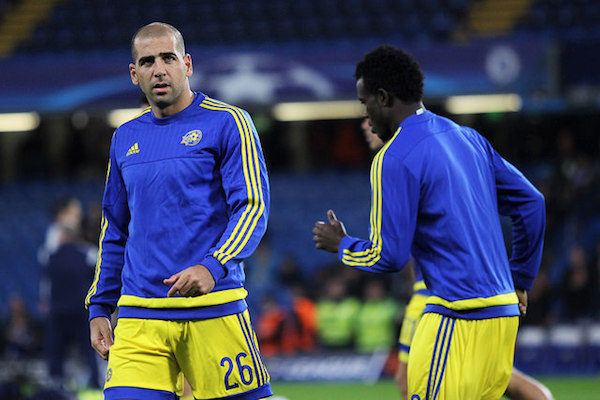Compared to the overt, oft-condemned and penalized racism of Beitar Jerusalem, Maccabi Tel Aviv’s racism is more mainstream. That makes it more dangerous.

An ugly brawl erupted on the soccer pitch on Tuesday at the end of a league match between Maccabi Tel Aviv and Bnei Sakhnin, which is the most successful Palestinian club in Israel. It followed a bad-tempered encounter between the two sides last week for a cup semi-final, when Maccabi player Tal Ben Haim — a decent soccer player but a dreadful sportsperson — disregarded one of the unwritten sporting codes of the game.
While Sakhnin player Ali Ottman was lying on the ground injured, Ben Haim chose to keep playing rather than kicking the ball out of play so that Ottman could be treated, as is custom around the world. Passing the ball to a team-mate instead, Ben Haim went on to score an unsportsmanlike winning goal. The result stood.
(As an illustration, when English team Arsenal scored a controversial winning goal in strikingly similar circumstances during a 1999 FA Cup game against underdogs Sheffield United, Arsenal manager Arsene Wenger offered for the match to be replayed. The Football Association agreed.)
But anyone who thinks that the seeds of Tuesday’s scuffle were sown during last week’s match is mistaken. The tensions started much before that, and are a result of Maccabi Tel Aviv’s policies.
Aside from Beitar Jerusalem, which has never had an Arab player and is more readily associated with racism on Israel’s soccer scene, most of the biggest soccer clubs in the country — Maccabi Haifa, Hapoel Beer Sheva and Hapoel Tel Aviv — all have four leading Arab players on their roster. At which club is not a single Arab to be found? Maccabi Tel Aviv. Surprising? No.
It’s worth comparing the two biggest and most supported teams in the land, Maccabi Haifa and Maccabi Tel Aviv. At Haifa, a club whose all-time record goalscorer is Zahi Armeli (yes, an Arab), there are usually at least two Arab players in the starting line-up, with Palestinians sometimes making up half the team that runs out onto the pitch.
Maccabi Tel Aviv, however, takes care to smuggle in the Palestinian players who are prepared to play for them. Maccabi fans have consistently cursed at Arab players on their team, from star acquisitions to graduates of the club’s youth academy. They apply pressure on the club’s management, who for their part are quick to relieve themselves of the unnecessary “burden” by trading the players in question. Since the club was taken over in 2009 by Mitch Goldhar, a rich Canadian Zionist, the number of Arab players has steadily dwindled.
The racist chanting in the stands; the fact that Maccabi’s “ultras” make sure to display excessive numbers of Israeli flags when playing Sakhnin; the hounding of their Arab players in recent years; and the management’s acceptance of the fans’ racist behavior: all this has generated a culture of racism at Maccabi Tel Aviv, which in turn has created an unhealthy political tension between it and Sakhnin.
The racism at the club is further enabled by the fact that Maccabi flies under the Israeli media’s radar, which instead prefers to focus on the antics of Beitar Jerusalem fans, particularly “La Familia,” and the complete absence of Arab players in the club’s entire history. But the decision of Maccabi Tel Aviv players to wrap themselves in the Israeli flag following Tuesday’s match shouts out the subtext that Arabs have no place here. In other words, those Maccabi players are no less racist than members of “La Familia.”
This mainstream racism, as depicted by Maccabi Tel Aviv, usually hides behind the more overt and vocal racism of Beitar and its fans. But it is the real and more dangerous racism. It’s exactly the same as Zionist Union leader Isaac Herzog enjoying mainstream legitimacy when he speaks about his imaginary unrequited love for Arabs, compared to when the Baruch Marzels, the Benzi Gopsteins and the rest of the wacky right utter the same pearls.
That’s exactly how it is with Maccabi Tel Aviv when compared to Beitar Jerusalem. Under the cover of Ashkenazi owners, as opposed to Beitar’s Yemenite boss, Maccabi is in fact no less racist a club than Beitar. But Maccabi enjoys its privileged status in the media, which will continue to anoint Beitar alone as the most racist football club in the country.
Maccabi’s behavior and attitude make for the consummate analogy to Zionism. It is a club that is convinced the entire world is against it, and as a result chooses to show contempt for the rules and do anything and everything in order to win — including breaking ethical codes. Matches against Sakhnin draw out the true colors of this dangerous club, which are essentially blue and white. At Tuesday’s game, Maccabi’s players showed just how much these colors suit them.
And what do we wish for Goldhar, Ben Haim and the rest of Maccabi’s players? That Tuesday’s match against Sakhnin, which finished in a draw, will end up costing them the championship, and that they will lose the cup final to a Haifa team featuring Yossi Benayoun and Taleb Tawatha. Because in football, we fight racism on the field.
A version of this article was first published in Hebrew on Local Call. Read it here.

